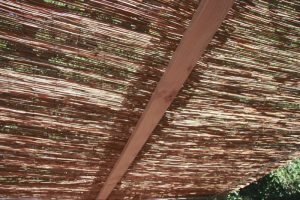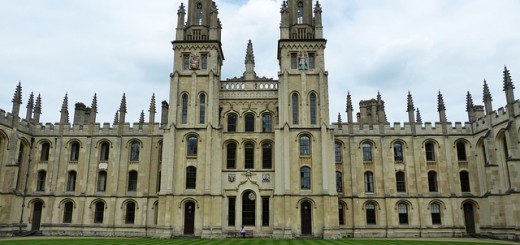Look Up!

We regard the enclosures where we spend Sukkos as, well, sukkos. And they are, of course; the walls comprise a necessary part of a sukkah. But it’s their roofs – the bamboo poles or mats woven for the purpose from slivers of the same material, or branches or leaves or thin, unfinished wooden slats – that give the structures their name.
The roofs, that is, made from vegetation once-alive but now detached from the earth it needs to grow: s’chach.
That word is from the Hebrew socheh, meaning to “cover” or “hover over.”
But there is another meaning to that Loshon HaKodesh word, as various sefarim note, namely “to see” or “to perceive.” That association would seem to imply that a sukkah somehow provides some special perspective. And, of course, it does.
On even the most mundane plane, living in a small rudimentary hut for a week, within sight of, yet apart from, one’s more comfortable, more spacious home, does afford a different point of view.
Like about our vulnerability, and reliance on Hashem’s everlasting rachamim. While our sturdy houses may be nearby, and if it rains hard enough we can – indeed should – return to surer shelter, our exposure to the elements in the sukkah, if we only care to ponder it, just magnifies our exposure to all sorts of threats, even in our “secure” abodes.
Not only are those abodes subject to other natural disasters – which we may not often think about, but should all the same, even if we don’t live in earthquake or flood zones – but there are dangers lurking wherever we are. Bad drivers and bad people, obstacles to trip over and germs with the potential to lay waste to our good health… That is part of the perspective granted the thoughtful sukkah-dweller.
But there is more. What the sukkah allows us to perceive, if we try, is that our homes and their contents are not us. That is to say, our possessions don’t really matter. The mindless man in a fancy car with the bumper sticker reading “The one who dies with the most toys wins” reflects a mainstream conviction, but it’s as far from Jewish belief as east is from west. Sitting in our primitive week-house, we come to know that what we have accumulated is simply not essential. In fact, no matter how much it may have cost us, in the end, it’s meaningless fluff.
Which is why Sukkos is zman simchaseinu.
No, I’m not being facetious. The happiness that is the theme of Sukkos and to which we make much reference in our tefillos on the holiday not only is not antithetical to our “deprivation”; it is born of it.
That’s because attaining true happiness begins with realizing what, despite its promise, doesn’t really make us happy. The “high” afforded by a new possessions dissipates quickly. The moment one first drives a new car, it becomes a used one.
What’s more, possessions only beget the desire, even the need, for yet more of the same, a truth that has come to be called the “hedonic treadmill” – “hedonic” meaning “pertaining to pleasure.” The treadmill mashal conveys the fact that the pursuit of happiness is like a person on a platform moving in the opposite direction, who has to keep walking just to stay in the same place. A person may achieve wealth, in other words, but his expectations and longings only rise in tandem. There’s no permanent net gain in happiness.
Chazal, of course, said it pithily: “He who has a hundred wants two hundred” (Koheles Rabbah 1:34).
And, as Chazal also said in many instances, pok chazi – “go out and look around.” At all the possession-endowed, that is, here: the entertainers, sports figures, best-selling authors, the old-moneyed and the lottery-winners. They may zip around in Lamborghinis and check the time on Rolexes, but is their happiness quotient necessarily greater than that of those who take the bus and keep time with a $5 watch? Are their grand estates more of a home than the simplest, cozy cottage? A cogent case could be made that the precise opposite is true.
In the end, dependency on having stuff is what keeps us from being truly happy. Because authentic joy comes from things unavailable from Amazon.com. Like our relationships with our parents and children and friends, and with our community. And, ultimately, with Hakadosh Baruch Hu.
So the sukkah is indeed a source of “sight,” or, perhaps better, insight. It opens our eyes, letting us better see that, ultimately, what we really have is not what we own, but what we are.
And, fully comprehended, that is the true path to simchah.
© 2018 Hamodia



Recent Comments